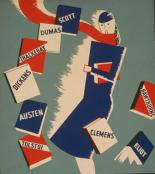 I will always love Ralph Nader for publicly validating English majors. I joined the Green party soon after his speech at the First Churches in Northampton in the summer before the fateful 2000 presidential election. He said a lot of things that were sensible, clear, and truthful to me, but he really got me on my feet when he invited all the English majors in the room to stand up. He said, “When I speak to young college graduates and I ask them what they majored in, sometimes I get a sheepish response from the English majors. I say, the world needs more people who read and think and apply critical thinking to world events. That’s what a liberal arts education can do for you. It’s something to be proud of, and it’s something to use.”
I will always love Ralph Nader for publicly validating English majors. I joined the Green party soon after his speech at the First Churches in Northampton in the summer before the fateful 2000 presidential election. He said a lot of things that were sensible, clear, and truthful to me, but he really got me on my feet when he invited all the English majors in the room to stand up. He said, “When I speak to young college graduates and I ask them what they majored in, sometimes I get a sheepish response from the English majors. I say, the world needs more people who read and think and apply critical thinking to world events. That’s what a liberal arts education can do for you. It’s something to be proud of, and it’s something to use.”
Whatever you feel about Ralph Nader, his reaching out to the lowly English major kind of brings a tear to the eye, doesn’t it? It did for me, in spite of the fact that I was (and am) fortunate enough to work at an organization that promotes the humanities by funding public programs and mounting its own. Even if my parents still don’t quite understand what I do for a living, and even if I can’t distill the mission of the Massachusetts Foundation for the Humanities into one cogent sentence that everyone will understand, I have the luxury of enjoying all the messy breadth that is represented by the humanities. It is the glorious ambiguity of the humanities and their engagement with questions of meaning, values, and ways of understanding reality that we aim to present with this new blog.
That’s right. Another blog. Surely there are enough words and visual noise in our lives without another claim on our attention.
This one is different. The Public Humanist is a group blog of 26 Massachusetts writers, many of them humanities professors of MA colleges, all of them in the idea business. They join this project to give voice to humanistic inquiry as it intersects with current day issues and social policy. You won’t find much of that (yet!) in the blogosphere; believe me, I looked.
Our format will be to present a weekly topic that two or more of our contributors will write about, offering different (but not necessarily opposed) perspectives. All bloggers, whether they are too proud to say so or not, desire some public feedback. That is very much the aim with this endeavor; I urge all readers to chime in and help us realize our goal of a civic discourse informed by our understandings of history, literature, philosophy, political science, religion, popular culture, and other areas of the humanities. Maybe we can make the humanities popular again, so that liberal arts majors and enthusiasts can proudly proclaim, “I’m a humanist.” Better yet, “I’m a public humanist.”

